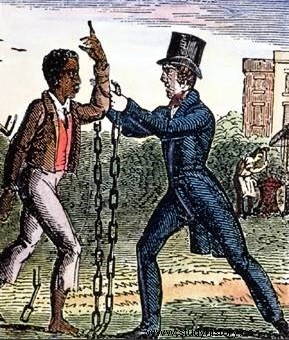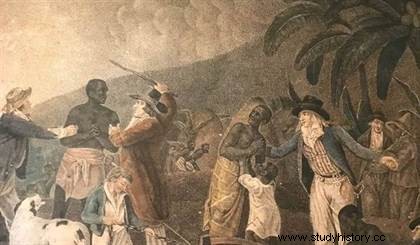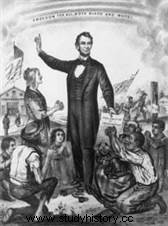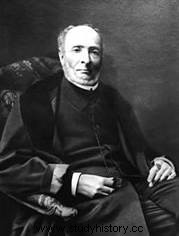 In France , the abolition of slavery was voted for the first time in 1794 during the Revolution, and became effective by the decree of April 27, 1848 initiated by Victor Schoelcher . The abolitionist movement began in the 18th century, and it quickly became international, even if it first affected the European countries which were the leaders of the slave trade. Thus Great Britain, which was the first to abolish slavery in 1807. Obeying ideological, religious, political and – we often forget – economic logics, the abolitionist movement experienced upheavals, successes and setbacks, before progressively lead to concrete and definitive abolitions throughout the 19th century. Since 2006, the abolition of slavery is commemorated in France on May 10.
In France , the abolition of slavery was voted for the first time in 1794 during the Revolution, and became effective by the decree of April 27, 1848 initiated by Victor Schoelcher . The abolitionist movement began in the 18th century, and it quickly became international, even if it first affected the European countries which were the leaders of the slave trade. Thus Great Britain, which was the first to abolish slavery in 1807. Obeying ideological, religious, political and – we often forget – economic logics, the abolitionist movement experienced upheavals, successes and setbacks, before progressively lead to concrete and definitive abolitions throughout the 19th century. Since 2006, the abolition of slavery is commemorated in France on May 10.
Abolition of slavery and the French Revolution
If the first criticisms of slavery and the slave trade began with the philosophers of the Enlightenment (Rousseau in particular), and the creation of the Society of Friends of Black in 1788, the Revolution accelerated the process. However, despite the Declaration of the Rights of Man and of the Citizen August 1789 and a trace of indignation in the notebooks of grievances, the Constituent Assembly did not initially touch on the slave system of the French colonies. It was not until the Saint-Domingue revolts of 1791 that slavery in the colonies was also abolished, by the decree of the Convention of February 4, 1794. Revolts which often weighed on decisions in favor of abolition, in France and elsewhere.
But from 1799-1800, while the concrete effects of the decree of February 4, 1794 (16 Pluviôse Year II) were hardly visible on the ground, abolition was called into question. The international context also has a lot to do with it. This leads to the decree of May 20, 1802, by First Consul Napoleon Bonaparte, which reestablishes slavery and the slave trade in the colonies.
Great Britain, the pioneer
It was in England that the first associations or "Societies" for the abolition of slavery appeared at the end of the 18th century. The petitions launched by these activists are very successful, provoking debates in Parliament. The reasons are diverse and still divide historians. The weight of the religious discourse is indisputable, but more pragmatic reasons are also mentioned, such as the loss of interest in the plantation system in the face of the industrialization of Great Britain, or the possibility, with the tracking of ships foreign slave traders, to make the Royal Navy "the policeman of the seas".
 In 1807, the abolition of the slave trade was voted in the British Parliament and, in 1815, the signatories of Congress Vienna agree to extend this ban. In 1833, slavery was banned in the English colonies. The British navy began to hunt illegal slave traders, and its overseas interventions were often justified by this fight against the slave trade. During the same period, the British Empire grew considerably.
In 1807, the abolition of the slave trade was voted in the British Parliament and, in 1815, the signatories of Congress Vienna agree to extend this ban. In 1833, slavery was banned in the English colonies. The British navy began to hunt illegal slave traders, and its overseas interventions were often justified by this fight against the slave trade. During the same period, the British Empire grew considerably.
Abolition success stories around the world
While Great Britain was a pioneer in abolitionist activism, it was Denmark which was the first country to officially abolish the slave trade in 1792. European powers were less pressed, and we had to wait until the second half of the 19th century to see the abolition applied by the Netherlands, Spain or Portugal, and their colonies. Above all, if the slave trade was abolished relatively early, and fell into illegality, slavery lasted a long time in the colonies.
 Independence in Latin America, and the influence of Simon Bolivar, matter in this process, which is all even quite slow, and extends over the whole century. Brazil only abolished it in 1888, three years after Cuba, the two countries being among the most active in the slave trade and slavery. In Africa, countries like Tunisia abolished it in 1846, but it was colonization that partly put an end to it, replacing slavery with other forms of exploitation of populations.
Independence in Latin America, and the influence of Simon Bolivar, matter in this process, which is all even quite slow, and extends over the whole century. Brazil only abolished it in 1888, three years after Cuba, the two countries being among the most active in the slave trade and slavery. In Africa, countries like Tunisia abolished it in 1846, but it was colonization that partly put an end to it, replacing slavery with other forms of exploitation of populations.
In the United States, the abolitionist movement followed the British model from 1815, but culminated with the John Brown affair (1859-1860). We then know the importance of the Civil War in the abolition of slavery, decided by Abraham Lincoln on January 1, 1863, and extended to all the United States in 1865.
The abolition of slavery in France
The process is longer and more chaotic than in Britain, but again builds on it. In 1834, the French Society for the Abolition of Slavery was created. . The same year, the Martinican Cyrille Bissette, a descendant of slaves, demanded “the complete and immediate abolition” . However, it was not until Victor Schoelcher's trip to the Caribbean in the early 1840s that the movement accelerated.
Schœlcher is a spokesperson for the abolitionist movement. He then published two works:French colonies, immediate abolition of slavery (1840) and Foreign colonies and Haiti, results of English emancipation (1843). He demands that we denounce the restoration of slavery by Napoleon Bonaparte (1800) and the conservatism of the colonists who justify slavery by the inferiority of the “black race”. The Republican launched a petition in 1847, which met with some success, except with the Catholic Church, which was still ambiguous and divided on the subject.
 The fall of Louis Philippe and the establishment of the Second Republic in 1848 led Schoelcher to the post of Under-Secretary of State to the Navy and the Colonies. This allowed him to promote abolition, leading to the decree of April 27, 1848. On May 22, the governor of Martinique proclaimed freedom, followed four days later by Guadeloupe. In Guyana, slavery ends on August 10, and in Reunion on December 20. These different dates partly explain the controversies born around the choice of the day dedicated by the Republic to the commemoration of abolitions.
The fall of Louis Philippe and the establishment of the Second Republic in 1848 led Schoelcher to the post of Under-Secretary of State to the Navy and the Colonies. This allowed him to promote abolition, leading to the decree of April 27, 1848. On May 22, the governor of Martinique proclaimed freedom, followed four days later by Guadeloupe. In Guyana, slavery ends on August 10, and in Reunion on December 20. These different dates partly explain the controversies born around the choice of the day dedicated by the Republic to the commemoration of abolitions.
Remembrance Day
Following the Taubira law of May 21, 2001, a date must be chosen to commemorate the abolitions. A Committee for the Memory of Slavery is named, but the controversies are bitter over the choice of the date, May 23 for example, being claimed by West Indian associations. Moreover, should the abolition and/or the memory of the victims be commemorated? In 2006, President Jacques Chirac finally chose May 10, the date of the last reading of the Taubira law in the Senate, and which does not replace other commemorations, on different dates, in the overseas departments. If May 10 now celebrates the abolition of the slave trade and slavery, the Fillon circular of May 2008 made May 23 the official day of commemoration of the victims.
Bibliography
- O. Pétré-Grenouilleau (dir), Abolish slavery. Putting reformism to the test, PUR, 2008.
- M. Dorigny, B. Gainot, Atlas of slavery, Otherwise, 2006.
- F. Regent, France and its slaves. From colonization to abolitions (1620-1848), Pluriel, 2009.
